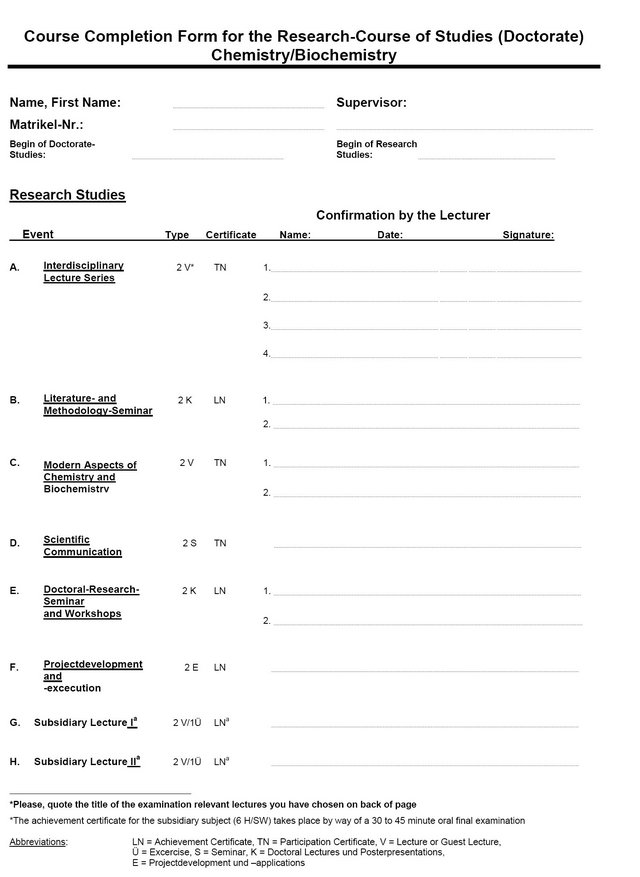The Center for Theoretical Chemistry (Lehrstuhl für Theoretische Chemie) offers a doctoral research and PhD program in the subject areas of Theoretical Chemistry and Theoretical Biochemistry in the framework of the Graduate School of Chemistry and Biochemistry (GSCB). This program, which is held in the English language as all the Master's classes, leads to the traditional German PhD degree in natural sciences “Dr. rer. nat.”.
All doctoral students are automatically members of the GSCB. They profit from an international environment, a challenging curriculum and courses held in English. In addition, professional administrative and integrative services are offered to international students, including German language courses.
The doctoral study program requires a M.Sc. degree (or an equivalent degree, e.g. Diplom) and is tailored to run for three years, but the minimum qualifications for the PhD degree can already be obtained after two years.
In addition, there is a “fast-track option” which enables students to commence their PhD immediately after completion of their B.Sc. studies. This route, however, requires an excellent B.Sc. degree and a mandatory one year preparatory course as specified in the study regulations.
All of the necessary information such as admission details, study regulations, curricula and courses including all forms and documents can be found on the homepage of the GSCB
General questions about the graduate school and its programs should be addressed to the GSCB (gscb@rub.de), whereas specific questions about obtaining a PhD in the subject areas of Theoretical Chemistry and Theoretical Biochemistry should be addressed directly to the Professors of Theoretical Chemistry (theochem@theochem.rub.de).
Layout of the Course Completion Form:
- Event A “Interdisciplinary Lecture Program”:
Regular participation throughout your doctoral studies is expected in the general chemistry and biochemistry colloquia, the so-called “Gemeinsames Kolloquium von GSCB, GDCh, GBM”, which takes place on Thursdays at 5 PM. Eight of these lectures must be selected by the student to be a relevant part of the final doctorate examination. Your advisor must confirm that you participated. - Event B “Literature and Methodology Seminar”:
You must give two oral presentations on your research within the Theoretical Chemistry Colloquia which take place on Wednesdays at 2 PM. Upon request, this can be substituted by oral(!) presentations of your research on external workshops (including general SFB, FOR etc. meetings) or conferences. Your advisor must confirm that you achieved this. - Event C “Modern Aspects of Chemistry and Biochemistry”:
You are expected to participate in two lectures covering special research topics in Theoretical Chemistry or Theoretical Biochemistry, a wide range of which is offered by the Center for Theoretical Chemistry. Your advisor must confirm that you participated. - Event D “Scientific Communication”:
You must participate in a soft skill course on scientific writing or presentation which is offered by the GSCB in collaboration with the RUB Research School, check there for current programs and schedules. A certificate is issued by the GSCB to confirm active participation. - Event E “Doctoral Research Seminar and Workshops”:
You must give two active (oral or poster) presentations of your research on external workshops (including general SFB, FOR etc. meetings) or conferences. Your advisor must confirm that you achieved this. - Event F “Project Development and Execution”:
After the first year you are expected to write an interim report on the research that you performed and a research application, i.e. an outline of the research that you plan to perform in the future. This can be, for instance, a grant proposal for computer time at a supercomputer center which includes a report on your own preliminary work. Your advisor must confirm that you achieved this. - Event G “Subsidiary Lecture I”:
You must participate in two lectures, I and II, (each 2+1 SWS, i.e. two hours of lectures and one hour discussion section per semester week) in a subsidiary subject. The content of the lectures chosen should not have too close an affinity to the subject area of the PhD thesis (i.e. Theoretical Chemistry/Biochemistry). Written application by the candidate to the examination office is required before participation so that the doctorate committee (Promotionsausschuss) can decide upon the eligibility of the proposed teaching courses. The certificate of achievment for the subsidiary lectures is obtained by way of a 30 to 45 minute oral examination, attested and graded by the lecturer of classes I and II. - Event H “Subsidiary Lecture II”:
See Event G.
This compilation serves information purposes only and the reader is referred to the GSCB for legally binding regulations, forms and documents.




